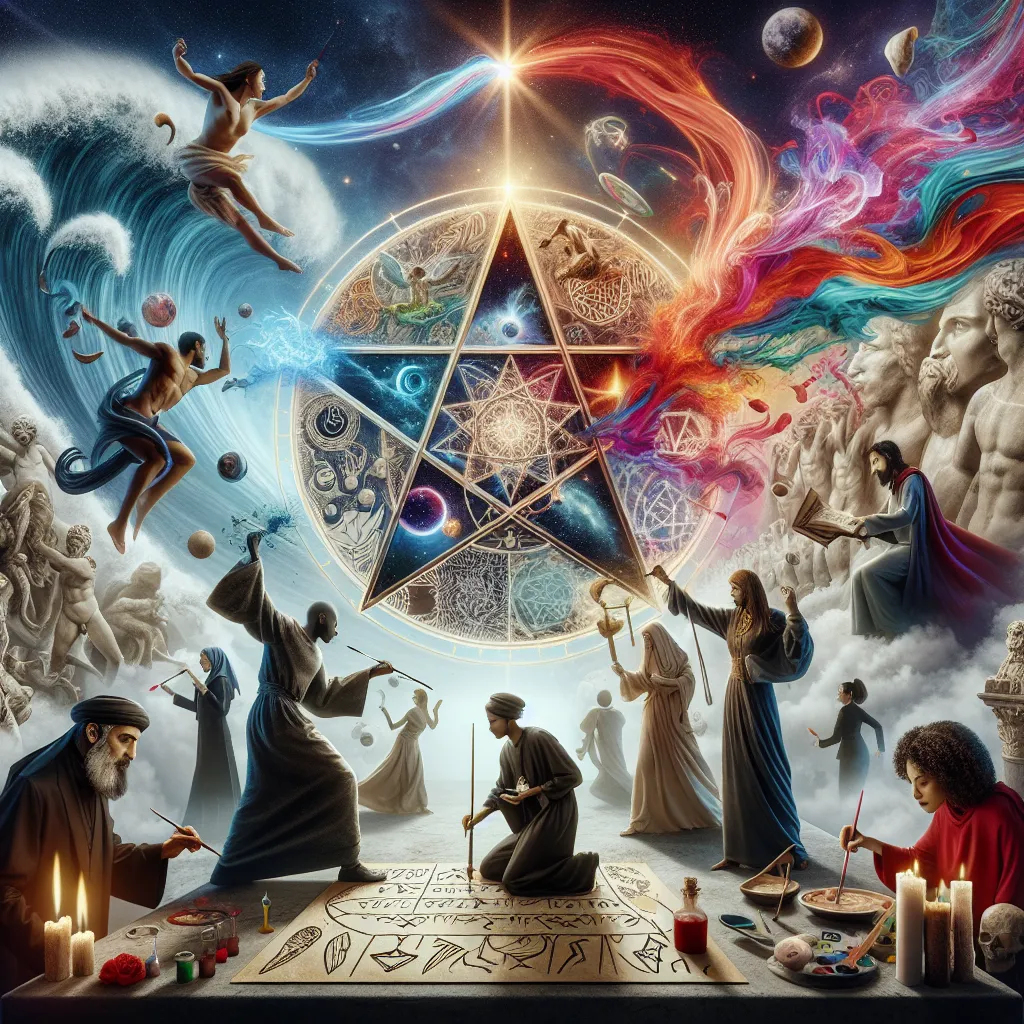
- Published on
- Authors

- Name
- You
Chaos Magick and Art: Creativity as a Magickal Act
Chaos Magick has long fascinated both magicians and artists. This unique form of magick is grounded in the notion that belief itself is a tool, which can be manipulated to achieve any desired outcome. Simultaneously, artistic expression is one of humanity's earliest forms of self-expression and transformation. This article explores the symbiotic relationship between chaos magick and creativity, and how they intersect to become a powerful magickal tool.
The Essence of Chaos Magick
Chaos Magick, often described as one of the most avant-garde forms of modern magick, challenges conventional magickal practices by discarding the need for complex rituals and rigid belief systems. Pioneered in the late 20th century, chaos magicians like Peter J. Carroll and Ray Sherwin emphasized the fluidity of belief, advocating for a pragmatic and eclectic approach. The core principle is that reality can be molded through the intentional manipulation of belief and will, making it accessible and adaptable for anyone committed to the practice.
The Artistic Dimension
Art, in many cultures and epochs, has been intertwined with magick and spiritual practice. From the cave paintings in Lascaux to the sacred geometries of the Renaissance, creativity has served as both an expression of the divine and a medium for transformation. Artists transport themselves into altered states of consciousness, much like shamans on vision quests, transmuting their experiences into visual, auditory, or performative masterpieces. This process can be seen as inherently magickal, as it involves channeling unseen forces into tangible forms.
Table: Comparative Elements of Chaos Magick and Artistic Practice
| Aspect | Chaos Magick | Artistic Practice |
|---|---|---|
| Belief System | Fluid, adaptable, and eclectic | Personal, often evolving, influenced by diverse sources |
| Rituals | Simplified, focus on the intent and symbolism | Varied, includes routines and processes |
| State of Mind | Altered states, gnosis through trance or focus | Flow state, creativity, and exploration |
| Tools and Materials | Sigils, symbols, ritual objects | Mediums like paint, music, sculpture, performance |
| Outcome | Transformation of reality through will | Transformation of perception and emotional states |
Creativity as a Magickal Tool
Creativity can serve as a potent magickal tool in multiple ways:
Sigil Creation: In chaos magick, sigils are a common practice where a desire or intent is condensed into a symbolic form. Similarly, artists condense emotions, stories, and visions into their artwork. Crafting a sigil can be seen as an art form itself, channeling the creator's will and imagination into a visual representation of their intent.
Ritual Art: The act of creating art can be ritualistic, mirroring the structure and purpose of magickal ceremonies. Whether it's through music, painting, or dance, the repetitive and immersive nature of creating art can induce altered states of consciousness, much like meditation or invocation.
Symbols and Archetypes: Artists frequently draw upon universal symbols and archetypes to convey deeper meanings, much like magicians use symbols that resonate on an unconscious level. These symbols can cross cultural and temporal boundaries, tapping into the collective unconscious described by Carl Jung.
Case Study
Consider the infamous surrealist Salvador Dalí. His works are replete with dreamlike symbols, peculiar landscapes, and distorted realities. Dalí explored the realms of the unconscious mind, much like a chaos magician seeks to unveil hidden layers of reality. His creative process involved meditative states and explorations of the psyche, blurring the boundaries between art and magick.
Practical Exercise: The Artistic Spell
To harness creativity as a magickal act, follow this simple exercise:
- Set Your Intent: Clearly define your desired outcome. It could be anything from personal growth to manifesting a new opportunity.
- Create a Symbol: Design an abstract or literal symbol that represents your intent. This can be a drawing, painting, or any form of visual art.
- Focus Your Energy: Dedicate time to work on your artistic piece in a meditative state. Pour your intention into every stroke and detail.
- Ritual Completion: Once finished, display the artwork in a place where you can frequently view it, reinforcing your intent through ongoing visual affirmation.
Conclusion
In conclusion, chaos magick and artistic expression are deeply interconnected disciplines that, when combined, can vastly amplify a practitioner's magickal prowess. Both art and magick are about transformation—of the self, of one's surroundings, and of the world. By recognizing the creative process as a magickal act, we can unlock profound new methods of influencing reality in alignment with our will.
By embracing the versatile nature of chaos magick and the boundless possibilities of artistic expression, we empower ourselves to become both the artist and the magician of our own reality.
Have questions or want to share your experiences with Chaos Magick and creativity? Drop a comment below or join the conversation on our community forum!
